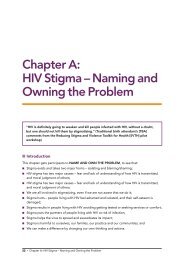Implementing Multiple Gender Strategies to Improve HIV and ... - ICRW
Implementing Multiple Gender Strategies to Improve HIV and ... - ICRW
Implementing Multiple Gender Strategies to Improve HIV and ... - ICRW
Create successful ePaper yourself
Turn your PDF publications into a flip-book with our unique Google optimized e-Paper software.
developing memory books, scrapbooks that use s<strong>to</strong>ries, pho<strong>to</strong>s, <strong>and</strong><br />
important documentation <strong>to</strong> help <strong>HIV</strong>-positive parents ensure that their<br />
children will have some linkage <strong>to</strong> their past. Men are also trained as<br />
“Ambassadors of Hope,” individuals who publicly acknowledge their <strong>HIV</strong><br />
status <strong>to</strong> fight stigma in the community.<br />
To increase the legal protection of women, the program trains paralegals<br />
<strong>and</strong> community media<strong>to</strong>rs in alternative dispute resolution. These<br />
community media<strong>to</strong>rs work closely with village elders <strong>and</strong> chiefs <strong>to</strong> resolve<br />
civil disagreements at the community level instead of going through the<br />
expensive <strong>and</strong> time-consuming court processes. Aggrieved parties are<br />
referred <strong>to</strong> the appropriate law enforcement agencies for information <strong>and</strong><br />
support.<br />
The program also works <strong>to</strong> increase access <strong>to</strong> income <strong>and</strong> productive<br />
resources for single women household heads, offering them training on<br />
basic business skills, providing access <strong>to</strong> business products, <strong>and</strong> creating<br />
linkages with microfinance institutions. The program also offers household<br />
food security trainings <strong>to</strong> women <strong>to</strong> ensure they can produce enough food<br />
<strong>to</strong> feed their families (as opposed <strong>to</strong> depending on relief food), which<br />
includes skills in multi-s<strong>to</strong>ry gardens, kitchen gardens <strong>and</strong> organic farming.<br />
This training is supported with the provision of seeds <strong>and</strong> farm equipment.<br />
In addition, the program provides vocational training, including hairdressing,<br />
fashion <strong>and</strong> design, <strong>and</strong> information technology, <strong>to</strong> young girls who have<br />
dropped out of school.<br />
Target Audience<br />
Orphans, vulnerable children, <strong>and</strong> their families<br />
Level of Intervention<br />
Community<br />
Geographic<br />
Location<br />
Nakuru Municipality, Nakuru District, Rift Valley Province<br />
Timeframe • Pilot phase: Oc<strong>to</strong>ber 2005–September 2007<br />
• Currently: Oc<strong>to</strong>ber 2008–ongoing<br />
Funders • Pilot phase: FHI<br />
• Currently: The U.S. President’s Emergency Plan for AIDS Relief<br />
(PEPFAR) through the United States Agency for International<br />
Development (USAID)<br />
Partner<br />
Organizations<br />
Implementation partners:<br />
• Ministry of Health, Kenya<br />
• Baraka Agricultural College<br />
• Child Care International<br />
• Family AIDS Initiative Response (FAIR)<br />
• Kenya Girl Guides Association (KGGA)<br />
• Learning <strong>and</strong> Development Kenya<br />
• SafeWater <strong>and</strong> AIDS Project<br />
• Society for Women <strong>and</strong> AIDS in Kenya (SWAK)<br />
• Tumaini na Fadhili<br />
• Appropriate Grass Roots Interventions (AGRI)<br />
• Muslim Association of Nakuru<br />
60
















